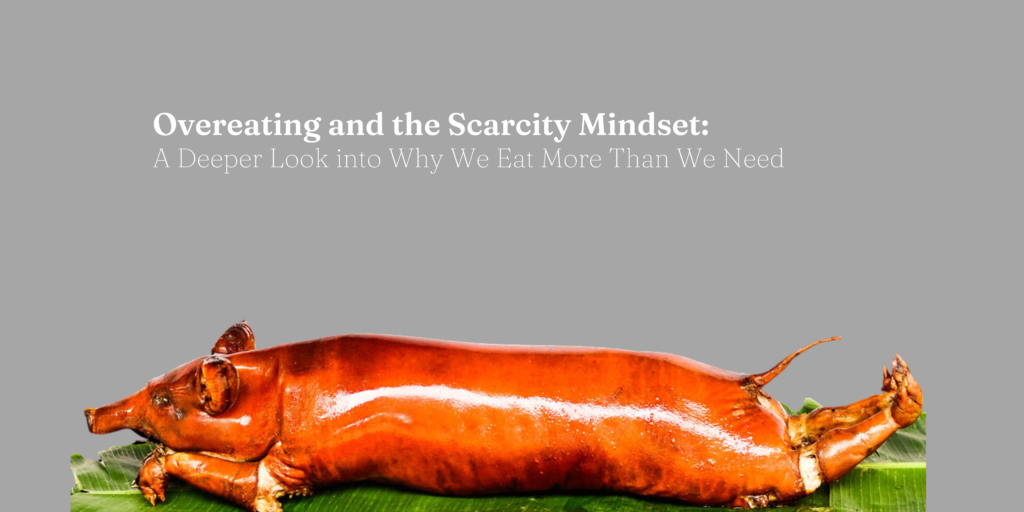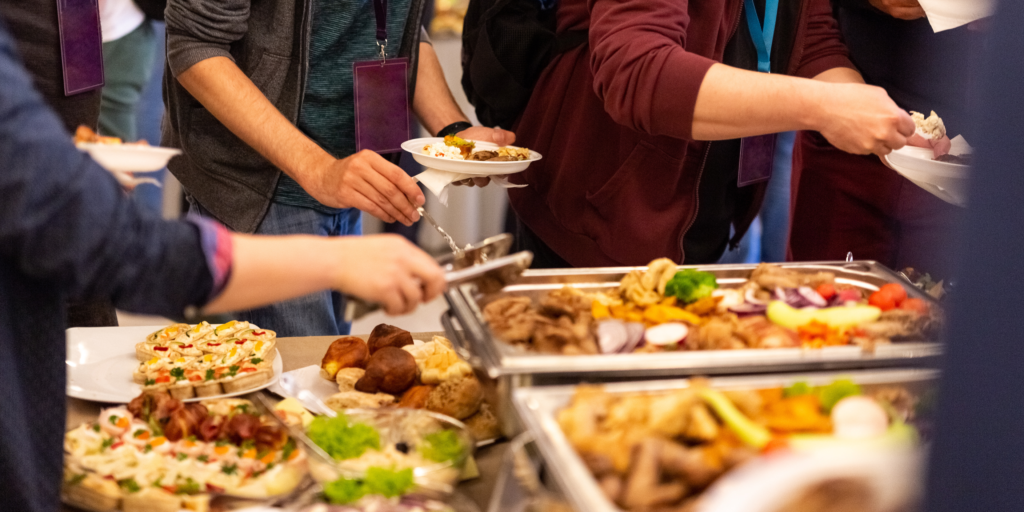A Deeper Look into Why We Eat More Than We Need The Problem: Why Do We Eat More Than We Need? Picture this: You’re at a buffet, surrounded by endless trays of food. The first thought that comes to mind? “Kailangan kong sulitin yung binayad ko.” Or maybe it’s a holiday dinner, the table overflowing …
A Deeper Look into Why We Eat More Than We Need

The Problem: Why Do We Eat More Than We Need?
Picture this: You’re at a buffet, surrounded by endless trays of food. The first thought that comes to mind?
“Kailangan kong sulitin yung binayad ko.”
Or maybe it’s a holiday dinner, the table overflowing with dishes you only see once a year. You pile your plate high, even though your stomach is already full, thinking,
“Sayang naman, minsan lang to.”
It’s not just about the food itself. It’s about something deeper – a belief system that many of us carry without realizing it. This belief is rooted in what’s often called the scarcity mindset.
What is the Scarcity Mindset?
The scarcity mindset a.k.a poverty mindset isn’t just about financial scarcity. It’s a mental framework that assumes resources – whether money, time, or food – are limited and fleeting. It’s a belief that we must take everything we can now because we might not have it later.
For many, this mindset develops early in life. If you grew up in an environment where food was limited or where treats were rare, you may have learned to associate abundance with urgency. Holidays, buffets, and celebrations become an excuse to overindulge because these moments feel like your only chance to “feast.”
The psychology behind this is fascinating:
- Scarcity Drives Overconsumption. When you perceive something as scarce, your brain amplifies its value. Food becomes not just nourishment but a symbol of opportunity. Your brain says, “Kain lang nang kain, minsan lang mangyari ‘to.”
- Emotional Attachment to Food. Food often carries emotional weight – comfort, celebration, or nostalgia. When paired with the scarcity mindset, these emotions intensify, leading to behaviors like overeating to avoid missing out on those feelings.
- Cultural and Social Reinforcement. Many cultures celebrate abundance with food. Think of the Filipino concept of “handa” during fiestas – a symbol of prosperity. Overindulgence isn’t just acceptable; it’s encouraged. Combine this with a history of scarcity, and the result is a powerful driver for overeating.

Why This Matters
At first glance, overeating during special occasions might seem harmless. But over time, this habit can take a toll:
- Physical Health: Overeating can lead to weight gain, bloating, and long-term issues like obesity, high blood pressure or diabetes.
- Emotional Health: The guilt and regret that often follow overeating create a negative cycle of shame and avoidance.
- Relationship with Food: Overindulgence reinforces the idea that food is something to be “taken advantage of” rather than enjoyed mindfully.
But perhaps the most significant consequence is this:
The poverty mindset keeps you trapped in a cycle of scarcity, even when abundance is available.
It convinces you to act out of fear rather than intention.
A New Way to Think About Food and Abundance
The first step to breaking free from the poverty mindset is recognizing that food isn’t going anywhere. You don’t need to eat everything today because you’ll have another meal tomorrow. Here’s how you can start shifting your perspective:
- Reframe Scarcity as Choice. Instead of seeing a feast as your only opportunity, view it as one of many moments to enjoy food. Tell yourself, “Hindi ko kailangang kumain nang madami dahil may iba pa namang handaan / kainan”.
- Focus on Quality Over Quantity. True abundance isn’t about how much food you consume but how much you savor the experience. Choose the dishes you truly enjoy and leave the rest.
- Connect with the Moment. Celebrations aren’t just about food – they’re about connection, joy, and gratitude. Shift your focus from what’s on your plate to who’s at the table.
Actionable Insights to Overcome Overeating
Here are practical steps to help you eat mindfully and break free from the poverty mindset:
- Practice the One-Plate Rule. At buffets or celebrations, limit yourself to one plate. Make it balanced: half vegetables, one-quarter protein, and one-quarter carbohydrate-rich foods.
- Pause Before Seconds. When tempted to go back for more, take a moment – about 5 – 10 minutes. Ask yourself: “Am I still hungry, or do I just want to try everything?”
- Set an Abundance Affirmation Before meals, remind yourself: “Lagi namang may masarap na pagkain. Hindi ko kailangang kainin lahat ngayon”.
- Reflect on Emotional Triggers. Are you eating because you’re hungry, or because of nostalgia, stress, or social pressure? Identifying the “why” behind your eating helps you avoid mindless eating and make intentional choices.
- Redefine Leftovers. Many people overeat because they fear wasting food. Instead, embrace leftovers as an opportunity to enjoy the same delicious meal later.
- Celebrate Mindfully. Choose two or three dishes you love, savor them, and skip the rest. Focus on the experience, not just the food.
Final Thoughts: Redefining Abundance
The poverty mindset teaches us to fear scarcity, but the truth is, we live in a world of abundance. Food isn’t going anywhere.
Celebrations aren’t diminished by eating less – they’re enriched by enjoying every bite mindfully.
The next time you find yourself tempted to overeat, ask yourself:
“Am I acting out of fear, or am I honoring my body and my health?”
True abundance comes not from how much you consume, but from how much you value yourself in every choice you make.
Join my newsletter for more resources that help you build healthier eating habits – sample meal plans, free nutrition coaching materials and other insights – delivered straight to your inbox.











